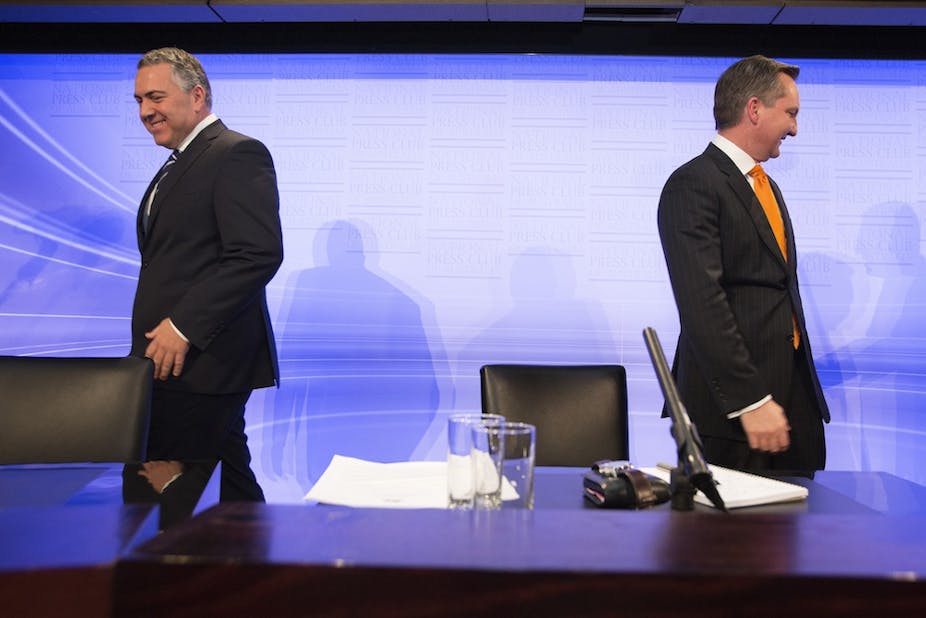Treasurer Chris Bowen didn’t have much ammunition at the National Press Club’s Treasurers’ debate. He could talk about the NBN, Disability Care, education spend, and the like, but not really about the actual economy.
As far as I can work out the government’s line is the mining boom is over, and that the economy is “transitioning”. Well, okay - transitioning to what exactly? The selling point is, “Who do you trust to manage that transition?”
His argument is two-fold. First, with the NBN and more government expenditure on education and health the economy will grow. It may, but I don’t see the causal link in that argument. I would have thought that allowing entrepreneurs to better manage their own businesses, by reducing red-tape and green tape, and by reducing the tax burden the economy will grow. Only then, if we wanted to, could we afford to spend even more than we currently do on education and health.
His second argument is to selectively point to the economic record of the past six years. It is true that Australia didn’t go into recession during the Great Recession. The dispute is why we didn’t go into recession. The government would have us believe that their massive stimulus packages in late 2008 and early 2009 are the reason.
Nice try. Full credit, however, is due to a generation of reforms that began in the early 1980s under Bob Hawke, continued by Paul Keating, and then John Howard.
The academic literature suggests that the stimulus packages did not “save” the Australian economy from recession. At the time of the stimulus debate the Australian Treasury relied on an unpublished preliminary paper by Christian Broda and Jonathan Parker into a similar US package to support their argument that the tax rebate announced as part of the federal government stimulus package would be spent, and not saved. At the time this paper did not say how much of the US cash hand-out had been spent - it simply indicated that cash had been spent.
A subsequent, more complete version of that paper) tells a slightly different story. Households did spend more, but only US$14 (out of US$950) in the first week after receiving the hand-out, and only US$30 - US$50 over the next seven weeks. A subsequent Australian replication of that study found that Australian consumers spent an additional $1 on non-durables after receiving the cash hand-out.
The less said about the pink batts fiasco and the school halls the better.
The fact is the government simply doesn’t have an economic narrative.
Joe Hockey is in a better position - he is promising to abolish the carbon tax and abolish the mining tax. He is also promising to abolish most of the associated spending that was to be financed by those taxes - but, unfortunately, not all the spending.
Abolishing the carbon tax is made easier by the fact that it is now a political orphan with Kevin Rudd arguing on Sunday that the government never had a mandate to implement it. Mind you, I am not at all a fan of the opposition’s “direct action policy”. The best that can be said for it, is that they don’t intend to spend very much money. Frankly, they can’t really afford to spend much money.
The Coalition also have their own smoke and mirrors. Today it we learnt that Tony Abbott’s big spend on paid parental leave will improve the budget position. To my mind this sounds like it comes from the “Wayne Swan School of Budgeting”.
The argument being that once you roll existing government spending into the new program and add in the revenue from the levy the government will be ahead. The PPL will also be subject to personal income tax - so the opposition is planning on transforming corporate tax revenue into personal tax income and then taxing it again. A very nice churn that will net the government income and make it difficult for future governments to abolish the levy.
Chris Bowen did the very best he could today - but he simply doesn’t have the raw material to fashion a coherent economic narrative. Joe Hockey is in a better position - there are bits of his narrative that I don’t like, but he does have a coherent story.

